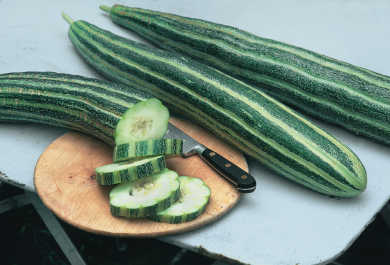(55 days from transplant) Open pollinated.
Also known as Armenian Cucumber or Snake Melon, native to Armenia and brought to Italy in the 15th century. William Woys Weaver says, “This is one of the oldest of our heirlooms, yet one of the most neglected by our gardeners,” often exhibited but seldom eaten. Yet its flavor surpasses that of cucumbers, excelling in salads and stir-fries without bitterness or burps.
Slender slightly fuzzy flexuous fruits delicately coil like a serpent with alternate light and dark green stripes.
Culture like the melon it is, starting indoors in individual pots and transplanting into a low tunnel. Will grow up to 30" but best eaten at 8–18". Straighter if trellised. Never grew well on CR’s central Maine clay, but a prolific producer in his sandy Colrain, MA, soil, beginning as early as July 26 one warm, dry season. About 24 seeds/g
Supplier Transparency:
③ Domestic and foreign corporations not part of a larger conglomerate






